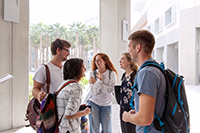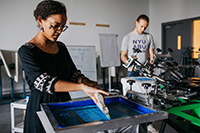-
Academics
-
Admissions
 Your journey to NYUAD starts here. Attend an application workshop or information session.Admissions Events
Your journey to NYUAD starts here. Attend an application workshop or information session.Admissions Events -
Research
-
Campus Life
 Live the possibilities. Be part of a dynamic community of students from over 115 countries.Take a Tour
Live the possibilities. Be part of a dynamic community of students from over 115 countries.Take a Tour - Public Programs
-
About
Exceptional education. World class research. Community-driven.Our Story
- News
- Events
- Social Media Directory
- Press Room
-
- Faculty
- Current Students
- Alumni
- عربي
Alexandra Mystikou
Research Associate
Affiliation: NYU Abu Dhabi
Education: PhD, University of Aberdeen;
Research Areas: Synthetic Biology, Algal Synthetic Genomics, Algal Genomics, Biotechnology
Alexandra Mystikou completed her Ph.D. at the University of Aberdeen in Scotland, UK, in 2015, where she did research on the seaweed biodiversity of the Antarctic and Subantarctic areas and on how climate change influences their distribution. She co-organized and participated in five scientific expeditions to the Falkland Islands between 2013-2016. In 2016, she moved to Abu Dhabi, UAE, where she first undertook a two-year teaching faculty position as an Assistant Professor at Zayed University. Since July 2018, she is a Postdoctoral Associate at New York University Abu Dhabi (NYUAD) based at the Laboratory of Algal Systems and Synthetic Biology (LASSB) and her research on Algal Synthetic Biology, Biotechnology and Genomics is funded by the Center for Genomics and Systems Biology (CGSB). She is sequencing algal genomes with the latest whole-genome sequencing platforms in order to discover promising UAE local and global strains that can be used for biotechnological applications. In parallel, she is developing synthetic genomic technologies, including a CRISPR-mediated methodology, to re-write and re-code algal genomes. Her research aims to set the foundations for the era of sustainability through the use of cost-effective, re-coded algal strains that would work as carbon-negative cell factories for pharmaceuticals, nutrition, energy, bioplastics, cosmetics, and more.
Visit Alexandra Mystikou's website.
Research
Alexandra through her research at the Laboratory of Algal, Synthetic, and Systems Biology (LASSB) in NYU Abu Dhabi, is discovering the key coding elements in algal genomes, and how can they be engineered to generate strains with superior characteristics. Her international collaborative project macro-ALG-ALL-CODE is tackling the lack of available macroalgal genomes by aiming to sequence (or “read”) 200 genomes from different climatic regions. The macro-ALG-ALL-CODE will deliver comparative genomics of those 200 genomes in order to identify unique adaptive patterns that influence their distribution and tolerance to extreme environments such as the Arabian Gulf and Polar regions. In parallel, she is also developing a CRISPR-mediated methodology to “write” microalgal genomes de novo. This approach is being implemented on the model green alga, Chlamydomonas reinhardtii, by replacing targeted chromatin segments with synthetically generated DNA, a task that has not yet been implemented in microalgae.
